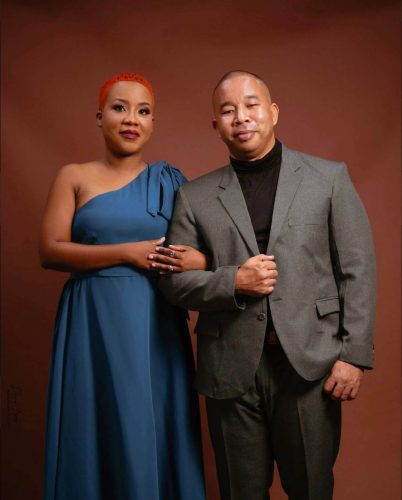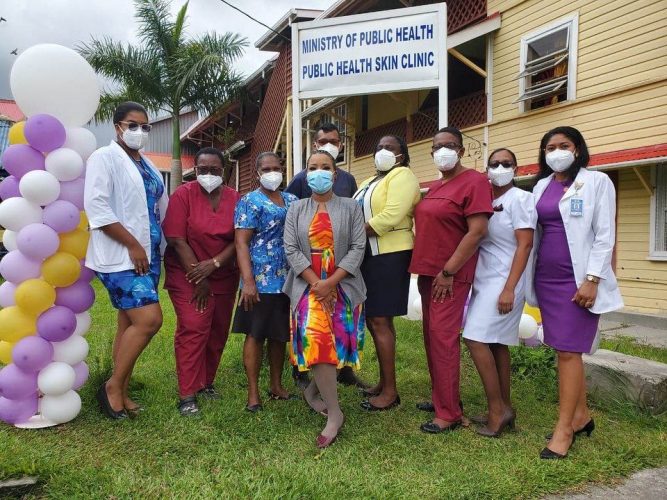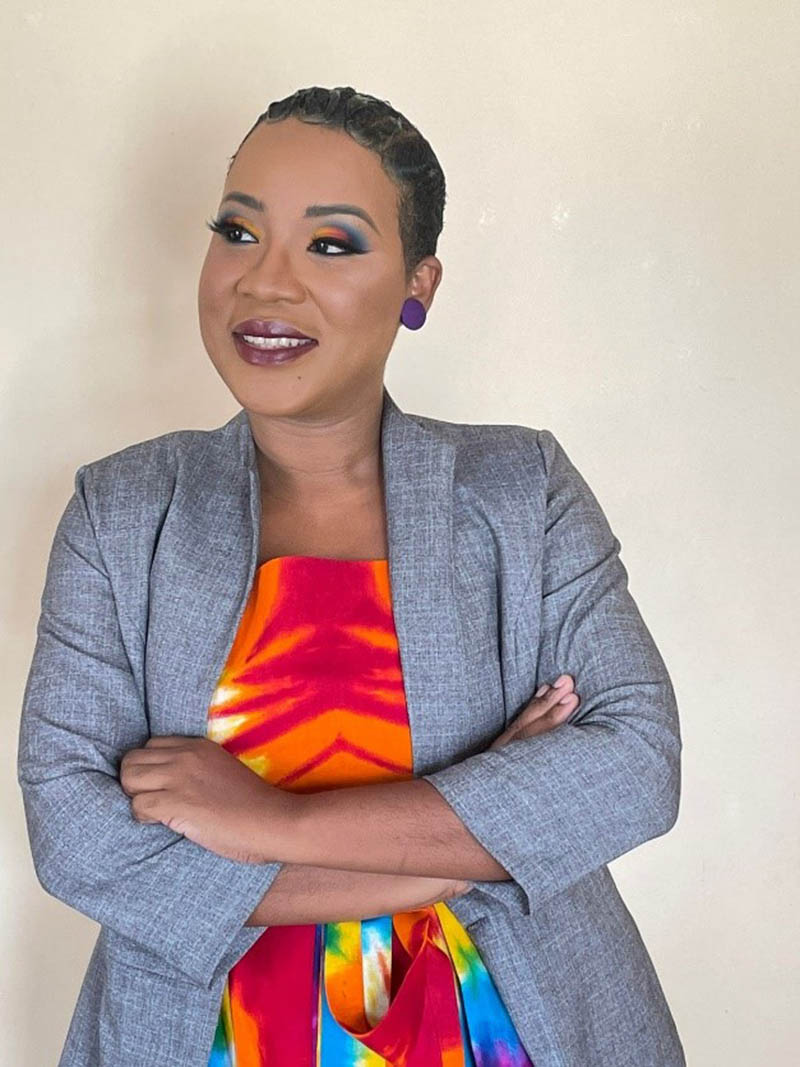If a young Heather Morris had her way, she would have become an artist, a pianist or even a lawyer but with guidance from her father she walked into the medical field and today as a dermatologist she is where she belongs. For her, treating skin diseases is more than just focusing on the condition but understanding the origin.
Dr Heather Morris-Wilson is the head of the Public Health Skin Clinic/National Leprosy Control Centre, where with her supportive staff of four other doctors, four nurses and a medical technologist she shines a light on the almost forgotten disease leprosy and also gives holistic treatment to the patients who walk through the door.
The centre is located in the compound of the Palms Geriatric Home on Brickdam, but about 13 clinics are held monthly around the country in an effort to identify new cases of leprosy.

Talking up leprosy, which many people forget exists, Dr Morris-Wilson pointed out that the disease’s main manifestation is on the skin. The team always tries to understand whether the skin condition a patient presents with is a symptom of another illness. In doing this they not only treat the condition but refer the patient for further diagnosis and treatment.
“We are very essential in the care of this neglected disease because leprosy doesn’t kill you, but it leads to a lot of morbidity…,” she pointed out in an interview with this newspaper. A person with leprosy can have nerve damage or go blind so the disease needs to be managed. As a result, Dr Morris-Wilson and her team hold a lot of public health campaigns in an effort to sensitise people about the disease, especially around January as the last Sunday in that month is World Leprosy Day.

At one time Guyana had a leprosy hospital at Mahaica, which not only catered for patients in Guyana but from other Caribbean countries. Today there are a few people who have been cured but are still accommodated there as social cases as they have nowhere else to live; their families abandoned them as stigma is still attached to the disease.
Dr Morris-Wilson said there are still people who believe that leprosy is a manifestation of the practice of obeah, a curse or a genetic disease.
“It is not. It caused by a germ, mycobacterium leprae which is the cousin of TB because the bacteria that causes TB is mycobacterium tuberculosis …so they are cousins,” she explained, adding that the leprosy bacteria is relatively harmless as the incubation period is very long.
From the time a person inhales the bacteria it can take between two to 40 years to actually start manifesting at the skin level. She said the bacterium likes the nerves. Leprosy, she said, also presents on the human body depending on their immunity, so people with a strong immune system have fewer lesions and these can be treated within six months. For those with weak immune systems, the treatment can last from 12 to 18 months. Medication for leprosy is given around the world free of cost and in Guyana with heavy support from PAHO this is a reality as well.
“The leprosy programme is very important because we need to have continued expertise, so training is very important for doctors in the other regions, regular training every month,” Dr Morris-Wilson said.
She explained that one, two or three dedicated people are needed in a region and they do not have to be doctors but could be nurses, or community health workers who will keep an eye out for suspicious cases and refer them to the centre.
While leprosy has been eliminated as a public health problem (meaning there is less than one case per 10,000 persons) Dr Morris-Wilson said there is still need to do so at a regional level. She said the programme does not reach Regions Eight and Nine so they are unsure of the number of cases in those regions as while there might be no case from a particular region it does not mean that none exist.
She shared that since the year started there have been 11 new cases and as such they cannot be laid back but have to keep working “and keep training and keep looking out”.
Volume of people
It was while working at the health centre level that Dr Morris-Wilson realised the volume of people who have skin conditions and in her bid to further assist her patients she visited the Palms and met with then head Dr Hollie Alexander.
“I just walked in and spoke with her and she was like ‘Oh you want to do skin? Well come!’ So, like two times a week from my clinic I came here and, you know, I sat in the clinics… and Dr Alexander mentored me and then she gave me this big surprise when she said, ‘Oh I put your name up to take over after me’,” she said.
While Dr Morris-Wilson expressed surprise, her mentor pointed out to her that she was enthusiastic about the field even as she encouraged her to do her post-grad in dermatology.
She took over in 2012 and when her youngest son was just six months old she received a scholarship to pursue her post graduate diploma and masters in dermatology at Cardiff University in Wales between 2016 and 2018.
“I came and I am here. It has been a wonderful journey,” she said.
A conversation with Dr Morris-Wilson will prove the above statement to be true as she can spend quite a lot of time talking about skin diseases and how to treat them. She is all ears for her patients as many times it is more than the skin condition; many just want someone to listen to them and if she determines that mentally they also need some help, she makes no bones about referring them.
Following her studies, Dr Morris-Wilson said, she returned empowered and at present she is trying to bring dermatology into the forefront as there is need for more doctors in the area.
“We need more persons to come into the field, not believing that it is easy [that] you are going to come in and just lay back because dermatology is actually the mother of medicine… so it is a lot more complicated than just seeing skin…,” she said.
While dermatology deals with skin, hair and nails, the doctor said that there are systemic manifestations of skin diseases. She gave the example of someone who has diabetes who will be prone to skin disease and even those who have heart and liver problems. Some skin conditions are also related to eye conditions.
“So, we don’t work in isolation…[and] being skilled in skin means that you send the patient where they supposed to go than treat not knowing that the underlying cause is a heart issue,” she pointed out.
She said at the clinic they see about 20 patients daily. She boasted that they are a clinic with a difference as they don’t want people to come and get treatment but if it is necessary patients are followed up or referred. They use the dermatology life
quality index in an effort to understand their patients when treating them.
“We would do our best to treat you and put you on the course to where you should go,” she said, adding that there is need for more public awareness on mental health.
She pointed out as well that some of the chronic skin diseases are associated with a poor quality of life and she has also asked her doctors to ask patients how the condition is affecting them mentally.
“Because a girl may come with just one spot and it is affecting her mentally and a patient can come with lesions all over their body and it is not affecting them,” she pointed out.
‘Steered’
Retracing her journey to becoming a medical doctor, Morris-Wilson said she did not want to become a doctor; it was not her career choice, rather she was “steered in this direction by my father”.
Her father, who hails from the village of Victoria, East Coast Demerara, had a tough upbringing as though he was bright his parents did not have the finances to ensure that he pursued his academic dream.
“I guess he grew up wanting his children to be the best that they can be,” she said of her father.
In her young days she wanted to become an artist as she was good at painting and graphics; she also had neat handwriting. Then she wanted to become a pianist, but her father would have none of it.
When she topped the Paradise Primary School and gained a place at St Stanislaus College, she toyed with the idea of becoming a lawyer, but later with the urging from her father and one of her teachers she entered the science stream with the intention of becoming a doctor.
She did well at Caribbean Secondary Education Certificate examinations and then later at A-Levels at Queen’s College and when she finally left school she entered the banking sector with the intention of working and saving for her studies. Three years later she and her brother secured scholarships to study medicine and civil engineering, respectively, in Cuba.
She excelled in Cuba and returned to Guyana for her final examinations and her internship for 18 months at the Georgetown Public Hospital and she has not looked back since even though during that period she realised that medicine was somewhat difficult.
As she put it, at the end of the internship she was “shipped off” to her home village health centre at Melanie and she also worked at the Buxton Health Centre. It was at these health centres that she realised that 90% of her consultations were people with skin conditions.
“I realised that this is something that is wanting, because, I mean, persons with chronic disease have skin issues, everybody has skin issues and they have no idea about skin care,” she said.
She pointed out that there are so many conditions that medicine alone can’t treat but the patient has to be counselled on behavioural changes among other.
And while it may sound clichéd, Dr Morris-Wilson said it is her love for people that keeps her going as she loves what she does. As a devout Jehovah’s Witness, she attempts to pattern her life after that of Jesus Christ as chronicled in the Holy Bible and she wants to love humans and do what is right and what is required. Prayer is important and from that she gets that strength to continue working.
“Even though sometimes I feel sick, I still [show up] because I feel people need me, people need me for the little skill I have, and my staff need me to support them. We are all imperfect. We get tired. We get upset. Things happen and it is overwhelming because it is a lot of work. But I am trying to balance my work not to feel overwhelmed, to delegate tasks and not to micro-manage and things like that…,” Dr Morris-Wilson said.
She believes doing the above helps to make her staff happy and when it is time to work, they work as there is so much they can do to help people.
Dr Morris-Wilson said she receives tremendous support from her husband, Dr Batukhan Wilson, who works at the COVID-19 hospital and is a consultant on emergency medicine. She described him as a “dedicated worker, a good husband and a good father”.
To make an appointment with the skin clinic, the number to call is 226-0679 as with the advent of COVID-19 walk-in patients are not facilitated. Patients must have a vaccination card.





